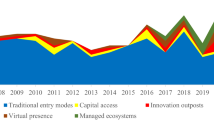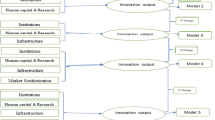Abstract
The way in which business ethics change over time will remain theoretically unclear unless we empirically reveal the temporal coevolution and coalignment among a changing environment, transitional institutions, strategic adaptations, and performance implications. To revitalize this coevolutionary perspective in business ethics research, in this special issue, we ask the following question: how do business ethics practices coevolve with a changing society and technology advancement as a result of the strategic choices of organizations in adapting to and shaping the environment? This special issue includes a collection of seven empirical studies of business ethics in China that differ in methodology and empirical context but collectively showcase the change in business ethics practices in an emerging economy and the processes underlying this change. Based upon the findings, we propose a conceptual model of the coevolution among business ethics practices, technological innovation, institutional transition and disruptive events; then, we pose questions for future research.

Similar content being viewed by others
Data Availability
This paper as a conceptual piece is not based on empirical data analysis and as such does not have data
References
Aguinis, H., & Glavas, A. (2012). What we know and don’t know about corporate social responsibility: A review and research agenda. Journal of Management, 38(4), 932–968.
Ahlstrom, D., Yang, X., Wang, L., & Wu, C. (2018). A global perspective of entrepreneurship and innovation in China. Multinational Business Review, 26(4), 302–318.
Albrecht, C., Thompson, J. A., Hoopes, J. L., & Rodrigo, P. (2010). Business ethics journal rankings as perceived by business ethics scholars. Journal of Business Ethics, 95(2), 227–237.
Baumann-Pauly, D., Scherer, A. G., & Palazzo, G. (2016). Managing institutional complexity: A longitudinal study of legitimacy strategies at a sportswear brand company. Journal of Business Ethics, 137(1), 31–51.
Chen, Y., Ping, L., & Liang, F. H. (2023). Industry reputation crisis and firm certification: A co-evolution perspective. Journal of Business Ethics. https://doi.org/10.1007/s10551-023-05438-5
Deng, P., Yang, X., Wang, L., & Doyle, B. (2017). Chinese investment in advanced economies: Opportunities and challenges. Thunderbird International Business Review, 59(4), 461–471. https://doi.org/10.1002/tie.21903
Dieleman, M., & Sachs, W. M. (2008). Coevolution of institutions and corporations in emerging economies: How the Salim group morphed into an institution of Suharto’s crony regime. Journal of Management Studies, 45(7), 1274–1300.
DiMaggio, P. J., & Powell, W. W. (1983). The iron cage revisited: Institutional isomorphism and collective rationality in organizational fields. American Sociological Review, 48(2), 147–160.
Garriga, E., & Melé, D. (2004). Corporate social responsibility theories: Mapping the territory. Journal of Business Ethics, 53(1–2), 51–71.
Greenwood, R., Raynard, M., Kodeih, F., Micelotta, E. R., & Lounsbury, M. (2011). Institutional complexity and organizational responses. Academy of Management annals, 5(1), 317–371.
Hu, H. W., & Zhang, J. (2023). How do corporate social responsibility and innovation co-evolve with organizational forms? Evidence from a transitional economy. Journal of Business Ethics. https://doi.org/10.1007/s10551-023-05435-8.
Jamali, D., & Mirshak, R. (2007). Corporate social responsibility (CSR): Theory and practice in a developing country context. Journal of Business Ethics, 72(3), 243–262.
Jenkins, H. (2009). A ‘business opportunity’model of corporate social responsibility for small- and medium-sized enterprises. Business Ethics: A European Review, 18(1), 21–36.
Jiang, W., Wang, K., & Zhou, K. (2023). How political ties and green innovation co-evolve in China: Alignment with institutional development and environmental pollution. Journal of Business Ethics. https://doi.org/10.1007/s10551-023-05434-9.
Kolk, A., & Tsang, S. (2017). Co-evolution in relation to small cars and sustainability in China: Interactions between central and local governments, and with business. Business & Society, 56(4), 576–616.
Lei, Y.-W. (2021). Delivering solidarity: Platform architecture and collective contention in China’s platform economy. American Sociological Review, 86(2), 279–309.
Lewin, A. Y., Kenney, M., & Murmann, J. P. (2016). China’s innovation challenge: Overcoming the middle-income trap. Cambridge University Press.
Lewin, A. Y., Long, C. P., & Carroll, T. N. (1999). The coevolution of new organizational forms. Organization Science, 10(5), 535–550.
Lewin, A. Y., & Volberda, H. W. (1999). Prolegomena on coevolution: A framework for research on strategy and new organizational forms. Organization Science, 10(5), 519–534.
Liu, X.-x., Xiong, F., & Du, X. (2023). Innovator or troublemaker? The co-evolution of legitimation and institutionalization of the ridesharing firms in China. Journal of Business Ethics https://doi.org/10.1007/s10551-023-05436-7.
Lockett, A., Wright, M., & Wild, A. (2013). The co-evolution of third stream activities in UK higher education. Business History, 55(2), 236–258.
Luo, X. R., Wang, D., & Zhang, J. (2017). Whose call to answer: Institutional complexity and firms’ CSR reporting. Academy of Management Journal, 60(1), 321–344.
Ma, Z., Wang, L., Li, E. P. H., & Zhang, J. (2022). Inter- versus intra-channel trust transfer on an online-to-offline (O2O) platform. Canadian Journal of Administrative Sciences, 39(2), 151–167.
Millar, C. C., Choi, C.-J., & Cheng, P. Y. (2009). Co-evolution: Law and institutions in international ethics research. Journal of Business Ethics, 87(4), 455–462.
Mirvis, P., Herrera, M. E. B., Googins, B., & Albareda, L. (2016). Corporate social innovation: How firms learn to innovate for the greater good. Journal of Business Research, 69(11), 5014–5021.
Morgeson, F. P., Mitchell, T. R., & Liu, D. (2015). Event system theory: An event-oriented approach to the organizational sciences. Academy of Management Review, 40(4), 515–537.
Nelson, R. R. (1995). Co–evolution of industry structure, technology and supporting institutions, and the making of comparative advantage. International Journal of the Economics of Business, 2(2), 171–184.
North, D. C. (1990). Institutions, Institutional change and Economic Performance. Cambridge University Press.
Oliver, C. (1991). Strategic responses to institutional processes. Academy of Management Review, 16(1), 145–179.
Osburg, T. (2013). Social innovation to drive corporate sustainability. Social innovation (pp. 13–22). Springer.
Pache, A. C., & Santos, F. (2010). When worlds collide: The internal dynamics of organizational responses to conflicting institutional demands. Academy of Management Review, 35(3), 455–476.
Pacheco, D. F., York, J. G., & Hargrave, T. J. (2014). The coevolution of industries, social movements, and institutions: Wind power in the United States. Organization Science, 25(6), 1609–1632.
Peng, M. W. (2003). Institutional transitions and strategic choices. Academy of Management Review, 28(2), 275–296.
Peng, M. W., Ahlstrom, D., Carraher, S. M., & Shi, W. S. (2017). An institution-based view of global IPR History. Journal of International Business Studies, 48(7), 893–907.
Prahalad, C. K. (2006). The Fortune at the Bottom of the Pyramid. Pearson Education India.
Rogers, E. M. (1962). Diffusion of Innovations (1st ed.). Free Press of Glencoe.
Scott, W. R. (1962). Innovations and organizations (4th ed.). Sage Publications.
Snider, J., Hill, R. P., & Martin, D. (2003). Corporate social responsibility in the 21st century: A view from the world’s most successful firms. Journal of Business Ethics, 48(2), 175–187.
Tan, J., & Litsschert, R. J. (1994). Environment-strategy relationship and its performance implications: An empirical study of the Chinese electronics industry. Strategic Management Journal, 15(1), 1–20.
Tan, J., & Tan, D. (2005). Environment–strategy co–evolution and co–alignment: A staged model of Chinese SOEs under transition. Strategic Management Journal, 26(2), 141–157.
Tan, J. (2009). Institutional structure and firm social performance in transitional economies: Evidence of multinational corporations in China. Journal of Business Ethics, 86, 171–189.
Tan, J., & Wang, L. (2011). MNC strategic responses to ethical pressure: An institutional logic perspective. Journal of Business Ethics, 98(3), 373–390.
Tan, J., Wang, L., Zhang, H., & Li, W. (2020). Disruptive innovation and technology ecosystem: The evolution of the intercohesive public–private collaboration network in Chinese telecommunication industry. Journal of Engineering and Technology Management, 57, 101573.
Wang, D., Wei, J., Noorderhaven, N., & Liu, Y. (2023). Signaling effects of CSR performance on cross-border alliance formation. Journal of Business Ethics. https://doi.org/10.1007/s10551-023-05432-x.
Wang, L., Xie, Z., Zhang, H., Yang, X., & Tan, J. (2021). Corporate compliance capability of EMNEs: a prerequisite for overcoming the liability of emergingness in advanced economies. International Journal of Emerging Markets, Ahead-of-Print,. https://doi.org/10.1108/IJOEM-04-2020-0324
Yip, G. S., & McKern, B. (2016). China’s Next Strategic Advantage: From Imitation to Innovation. MIT Press.
Zhao, M., Ma, X., Park, S. H., & Luo, L. (2023). Attention-based constraint to MNC coevolution in China's changing stakeholder environment. Journal of Business Ethics. https://doi.org/10.1007/s10551-023-05433-w.
Zhong, S., Zhao, X., & Song, J. (2023). MNEs’ ambidexterity strategies and moral conflicts: The case of Google in China. Journal of Business Ethics. https://doi.org/10.1007/s10551-023-05437-6.
Acknowledgements
We would like to express our sincere gratitude to Mary Sully de Luque, the editor of the Journal of Business Ethics, for her guidance and support throughout the publication process. We also thank Dan Li and the anonymous reviewers for their valuable feedback. The project was supported in part by research grants from Social Sciences and Humanities Research Council of Canada, and National Natural Science Foundation of China (72072124, 72272106, 72272083), and by the Center for Business Studies and Innovation in Asia-Pacific at the University of San Francisco.
Author information
Authors and Affiliations
Corresponding author
Ethics declarations
Conflict of interest
We as the authors hereby declare that there is no potential competing interest involved in the publication of the paper.
Research Involving Human Participants and/or Animals
Not applicable.
Informed Consent
Not applicable.
Additional information
Publisher's Note
Springer Nature remains neutral with regard to jurisdictional claims in published maps and institutional affiliations.
Rights and permissions
Springer Nature or its licensor (e.g. a society or other partner) holds exclusive rights to this article under a publishing agreement with the author(s) or other rightsholder(s); author self-archiving of the accepted manuscript version of this article is solely governed by the terms of such publishing agreement and applicable law.
About this article
Cite this article
Wang, L., Tan, J. Coevolution of Strategy, Innovation and Ethics. J Bus Ethics 186, 711–721 (2023). https://doi.org/10.1007/s10551-023-05439-4
Received:
Accepted:
Published:
Issue Date:
DOI: https://doi.org/10.1007/s10551-023-05439-4




